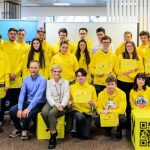Dr. Octavian Machidon, Universitatea din Ljubljana, Slovenia: Leveraging Approximate Mobile Computing to Bridge the Resources Gap
În cadrul Seminarului de Inovare și Dezvoltare organizat de Departamentul de Informatică, Dr. Octavian Machidon, cercetător la Universitatea din Ljubljana, Slovenia, va susține prelegerea intitulată Leveraging Approximate Mobile Computing to Bridge the Resources Gap. Dl. Machidon derulează o mobilitate Erasmus în cadrul Facultății de Matematică și Informatică, colaborare născută ca urmare a aderării Universității Babeș-Bolyai la alianța EUTOPIA.
Evenimentul se va desfășura în data de 22 iunie 2022, începând cu ora 11:00 în sala C335, clădirea FSEGA.
Abstract: Today we are witnessing mobile computing proliferation being threatened by the breakdown of Dennard scaling, a law describing the area-proportional growth of integrated circuit power use. This means that as transistor packing increases in a mobile device, additional energy will be required even though extended battery life is by far the most desired property that mobile users would like to see. We propose Approximate Mobile Computing (AMC) as a solution to this issue, and advocate that computation can often be sacrificed without a significant effect on a user’s perception of the end result. We start by investigating situations, such as mobile video playback and mobile deep learning for human activity recognition, where the properties of the input and the limitations of human perception open space for AMC. We continue by describing our solutions to bring AMC to consumer devices. The innovation our work brings is the development of execution adaptation algorithms that dynamically tune the level of approximation according to the context of usage. Lastly, we discuss future steps towards making AMC widespread and easy to deploy.
Brief Biography: Octavian Machidon received his PhD in electronics and telecommunications from Transilvania University of Brașov, Romania. From 2020 he joined the Faculty of Computer and Information Science (UL FRI), University of Ljubljana, Slovenia, to work on Approximate Mobile Computing. Since 2022 he is an Assistant Professor as this Faculty. Prior to this, he worked in the semiconductor industry at Intel eASIC and then he was a Lecturer at the Electronics and Computers Department, Transilvania University of Brașov, Romania. At UL FRI his research focuses on mobile computing and context-adaptive deep learning for resource-efficient mobile systems.















